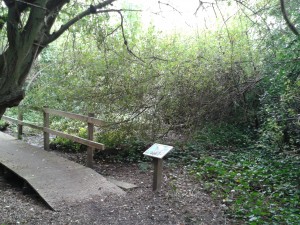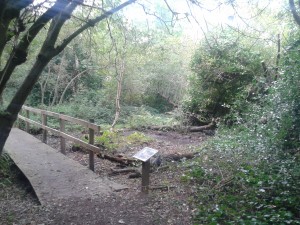This week down at the Gunnersbury Triangle I found myself faced with a rather large challenge: a willow had fallen on to another willow, which … had fallen on to a third, which had fallen right across our little ‘Mangrove Swamp’ wetland at the end of the reserve, and was overhanging the boardwalk that we had all rebuilt last winter.

I cut off all the small branches for two other volunteers to drag away for dead-hedging. Then I sliced off all the larger wood I could reach. The rest was alarmingly high up, or far too large for a bandsaw: much of it will have to wait for a chainsaw team. We held a little conference, and I realized I could cut some more by scrambling up on a fallen trunk. I sliced through a largish branch, and the cut end gradually sprang back to the vertical, ending four metres up, and posing a nice puzzle for anybody wondering how it might have been cut! We cut up and dragged away the considerable pile of bits, and I ended the day with a pleasantly clear ‘Mangrove Swamp’ area, bordered by a neat line of large horizontal willow trunks, defended by a thicket of holly which had become trapped and had regrown all around the fallen trees.

The other odd thing that happened was that the picnic meadow was utterly befouled by a filthy assortment of broken raw eggs, cotton wool pads, mashed potato from powder, pieces of raw onion and raw ginger, and nearly empty bottles of vinegar and vodka. It smelt terrible. The team picked the stuff up with gloves and a litter-picker, and we speculated how it had arrived there.
Our story is that a group of new students at the start of term held a night-time initiation ritual there en plein nature, each initiate being required to take a bite of onion, mouthful of mashed potato, shot of vodka, swig of vinegar, etc etc, and to pay a forfeit of being pelted with eggs if they flinched. Or maybe they were pelted willy-nilly, who knows. And then perhaps they tried to clean the worst of it out of their eyes with the cotton wool.
Whatever the truth of the matter, there is no doubt that city-dwellers make contact with nature in a myriad ways. Some go birdwatching; some microscopically study pond life; some walk or run or cycle in green and pleasant places; some hold drunken picnics. Perhaps we should value nature (and nature reserves) for its ability to support all these activities.
